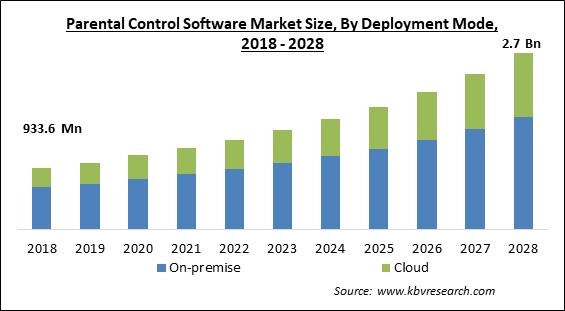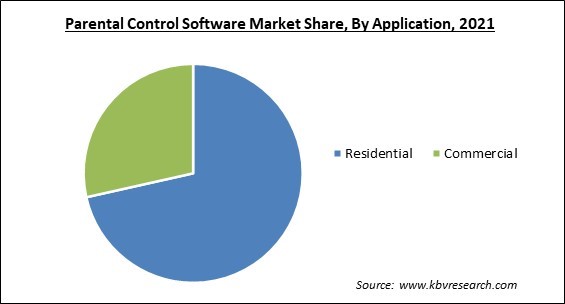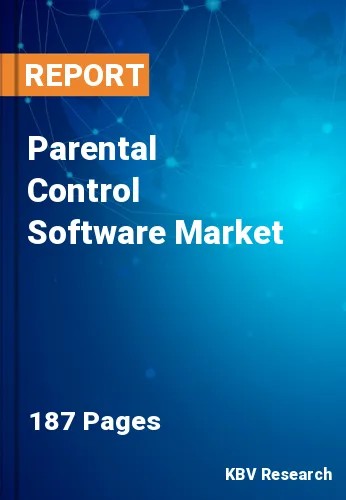The Global Parental Control Software Market size is expected to reach $2.7 billion by 2028, rising at a market growth of 11.9% CAGR during the forecast period.
Parental control technologies enable parents to limit their kids' internet usage. This stops kids from using computers, smartphones, or tablets to view inappropriate online content. For example, Vista's control panel has parental controls software that allows users to access accounts and monitor their kids' activities and behavior. This makes making a specific checklist for each device's parental settings easier, especially for family users.

Additionally, many schools now include laptops, PCs, and tablets in their curricula, which has boosted the demand for installing technologies that filter material and restrict websites. The expansion of the parental control software market is being driven by an increase in government regulations to standardize digital material for the safety of children. By using parental control software, parents can restrict their kids' access to inappropriate social media content and shield them from unethical behaviors like cyberbullying.
Additionally, youngsters use social media more frequently, are exposed to more online content, and have more access to personal devices overall. These elements so fuel the market expansion for parental control software. Kids can gain a range of educational, social, and recreational benefits from online content. Nevertheless, there are also perceived risks, particularly with regard to internet content and the social interaction and behavior issues connected to peer-to-peer communication enabled by the internet.
The parental control software also enables parents to restrict their kids' access to inappropriate social media content and aids in shielding kids from unethical behaviors like cyberbullying. Additionally, governments worldwide strongly emphasize maintaining kid safety laws for digital media applications. The need for parental control software has increased as games become more and more popular. Additionally, young people's growing usage of social media is pressuring parents to limit their children's screen time and internet access to protect them from potential dangers. The transition of the worldwide educational system to e-learning is accelerating market growth.
It is now crucial for parents to check the content their children are viewing on these networks. This has led to growing worries about cyber safety in addition to exposure to uncensored online content. In view of the growing emphasis on lowering the risk of children coming into contact with objectionable information online, many parents are considering the use of parental control software. The outbreak has increased demand for parental control software, which enables parents to keep an eye on and limit their children's Internet behavior. In light of the pandemic, it is anticipated that the use of online schooling will increase the market share for parental control software.
The effectiveness of parental control solutions has improved because of technological advancements and AI integration. Additionally, the worldwide rollout of 5G networks has a beneficial impact on the market expansion. Parental control programs are designed to monitor and regulate activity on digital tools and devices. In recent years, parental control software or apps have introduced several features, including screen time management, Family Link, and program management. Numerous platforms like YouTube, Facebook, etc., have accepted and incorporated parental control solutions to deliver better and safer services. This supports the growth of the regional market.
Tablets and smartphones have become an indispensable part of people's lives, especially children's, in recent years because of their enormous consumer popularity. As a result, the market for parental control software has also expanded due to the low cost of internet connection and the proliferation of smart devices such as smartphones, tablets, and PCs. Additionally, the recent expansion of the parental control software market has been impacted by rising digitization and the affordable availability of smart gadgets. Additionally, as youngsters use smartphones more and more, parental control software adoption will rise over the next few years. This supports the market share rise of parental control software.

The expensive software offers the cutting-edge capability and cutting-edge applications. Some parents might find this cost to be unaffordable. Some parents might not have the funds to invest in parental control software. Numerous websites offer cutting-edge capabilities at the hefty cost of parental control programs. Therefore, a significant barrier to implementing parental control technologies is their high initial cost. Given their heightened rights and access to a sizable amount of privacy-sensitive data, these parental control tools may aid in digital parenting but also pose substantial security and privacy threats to kids and parents. Therefore, the expansion of the market may be hampered by all these software-related issues.
Based on platform, the parental control software market is segmented into android, windows, iOS & others. In 2021, the windows segment held the highest revenue share in the parental control software market. The built-in parental control feature of the Windows operating system allows parents to block websites for free, generates online activity reports, and restricts access to any websites, apps, or games they don't want the children to use. This parental control program also enables users to set screen time limits, manage their shopping habits, and keep tabs on their whereabouts. The rising popularity of windows systems and the availability of cutting-edge software drives the demand for the product.
On the basis of deployment mode, the parental control software market is fragmented into on-premise, and cloud. In 2021, the on-premises segment dominated the parental control software market with maximum revenue share. On-premise, often referred to as self-hosted, is a configuration that allows users to run applications inside of their infrastructure. Users may fully control and own the platform, which provides better protection and more freedom for handling data, with on-premises hosting, giving them complete possession of it. The rise in access to internet-connected media devices, including smartphones, desktops, laptops, and tablets, as well as children's use of social media platforms, are the main factors driving the market for parental control software.
By application, the parental control software market is bifurcated into residential, and commercial. The commercial segment recorded a remarkable revenue share in the parental control software market in 2021. This is because school administrators in several locations, including North America, Europe, and the Pacific region, are increasingly concerned about safety and security. In addition, government programs encouraging digital transformation in education are also predicted to fuel sector growth throughout the projection period, especially in advanced nations like the U.S.
| Report Attribute | Details |
|---|---|
| Market size value in 2021 | USD 1.2 Billion |
| Market size forecast in 2028 | USD 2.7 Billion |
| Base Year | 2021 |
| Historical Period | 2018 to 2020 |
| Forecast Period | 2022 to 2028 |
| Revenue Growth Rate | CAGR of 11.9% from 2022 to 2028 |
| Number of Pages | 187 |
| Number of Table | 330 |
| Report coverage | Market Trends, Revenue Estimation and Forecast, Segmentation Analysis, Regional and Country Breakdown, Companies Strategic Developments, Company Profiling |
| Segments covered | Deployment Mode, Application, Platform, Region |
| Country scope | US, Canada, Mexico, Germany, UK, France, Russia, Spain, Italy, China, Japan, India, South Korea, Singapore, Malaysia, Brazil, Argentina, UAE, Saudi Arabia, South Africa, Nigeria |
| Growth Drivers |
|
| Restraints |
|
Region wise, the parental control system market is analyzed across North America, Europe, Asia Pacific and LAMEA. The North America region led the parental control software market by generating maximum revenue share. This is a result of the education sector's early adoption of digitization. North American software usage is accelerating due to government regulations managing children's online safety. Laws like the Children Online Privacy Protection Act (COPPA) in the United States protect children's data. In addition, parents are becoming increasingly aware of the importance of installing software on their children's gadgets because of the surge in cybercrimes such as cyberbullying, sexual harassment, and child abuse.
Free Valuable Insights: Global Parental Control Software Market size to reach USD 2.7 Billion by 2028
The market research report covers the analysis of key stake holders of the market. Key companies profiled in the report include NortonLifeLock, Inc., Microsoft Corporation, Google LLC (Alphabet, Inc.), Cisco Systems, Inc., Verizon Communications, Inc., McAfee Corp., AT&T, Inc., SafeDNS, Inc., SentryPC, and Kaspersky Lab.
By Deployment Mode
By Application
By Platform
By Geography
The global Parental Control Software Market size is expected to reach $2.7 billion by 2028.
Increasing need for cutting-edge AI and Ml-powered parental control software are driving the market in coming years, however, Concerns about software's data privacy and high initial cost restraints the growth of the market.
NortonLifeLock, Inc., Microsoft Corporation, Google LLC (Alphabet, Inc.), Cisco Systems, Inc., Verizon Communications, Inc., McAfee Corp., AT&T, Inc., SafeDNS, Inc., SentryPC, and Kaspersky Lab.
The Residential segment is leading the Global Parental Control Software Market by Application in 2021 thereby, achieving a market value of $1.8 billion by 2028.
The North America market dominated the Global Parental Control Software Market by Region in 2021, and would continue to be a dominant market till 2028; thereby, achieving a market value of $964.6 Million by 2028.
Our team of dedicated experts can provide you with attractive expansion opportunities for your business.

